Mrimaumri
1. Mrimaumri is a conlang created by the idea to make a language that has pretty sounds for singing songs. It should be smooth. It contains some rare consonant combinations and the use of the german diphtong "au" is the Erkennungsmerkmal. The grammar should be simple and unique. The language is not complete yet. It is open to changes to make the sound prettier.
2. Mrimaumri is a language of a conworld. The world is like a aviation world. Because of the spoilt poisoned soil people live on flying steel islands. The people also speak many rare natlangs and mixes of them. For example german and Japanese are more widespread than in the actual world. English is not dominant in this world. Language used in the conworld change and develop quickly. No one knows how mrimaumri rose. The inhabitants of the world are able to speak and learn many languages. That's the reason why no one knows on which influence mrimaumri rose. There is no inventor at all.
Introduction
Phonology
Orthography
Consonants
consonats for syllable construction
m [m]
mr [mʀ]
sm [sm]
cm(shm) [ʃm]
c [ʃ]
s [s]
t [t]
tm [tm]
tl [tl]
l [l]
lj [lj]
d [d]
dj [dj]
chx [χ]
chy [ç]
hr [ʀ] (am satzanfang hr geschriebe)
chxr [χʀ]
cr(shr) [ʃʀ]
fl [fl]
fs [fs]
p [p]
j(jot) [j]
gg(frz/russ.kehl-g) [ʒ]
vy(eng.j,dsch) [d͡ʒ]
v sometimes [v] and sometimes [w]
word ending consonants
g
d
m
n
t
rd
sd
l
ls
fs
sh
chx
chy
Vowels
vowels/umlaute/diphtonge for syllable construction and for solely use:
short vowels
a, i, o, u;
ê - not for syllable construction, only in kê;
long vowels
â, î, ô, û;
stressed vowels
°a, °i, °o, °u;
short umlaute
ä, ö, ü;
long umlaute
^ä, ^ö, ü;
stressed umlaute
°ä, °ä, ü;
short diphtonge
ea, ia;
au, ow, ai;
ai - not for syllable construction
long diphtonge
êa, eâ, êâ; îa, iâ, îâ; ^au, ^ow, ^ai;
stressed diphtonge
e°a, i°a, °au, °ow;
Prosody
Stress
Intonation
Phonotactics
Morphophonology
Morphology
Syntax
Constituent order
Noun phrase
Verb phrase
Sentence phrase
Dependent clauses
grammar
nouns
article
plural
verbs
negation
the word for not is lerêm
put the word lerêm after the verb to express that you don`t do something
tenses
Verben die auf r, p, b, d, f, s, c, vy, gg enden
-1. Vergangenheit mit anhängen von –ê
-2. Vergangenheit mit anhängen von –ˆö
-3. Vergangenheit mit anhängen von -ôl
Verben die auf Vokale, Diphtonge, umlaute, l, chx, chy und alle übrigen Konsonanten enden
-1. Vergangenheit mit anhängen von –dow/dai(chx/chy)
-2. Vergangenheit mit anhängen von –vôrn
-3. Vergangenheit mit anhängen von –döin
verbs with prefixes end in the 1.past in dow or ê like usual,
but in the 2. and 3. past in gg(if the basic form ends in a vowel) or ôgg(if the basic form ends in a consonant)
the 2.past and the 3.past is constructed with a form of "to have"
for example:
ral powl îsvôrn/îsdöin - I have/had eaten - Ich habe/hatte gegessen
kôr powc îsvôrn/îsdöin
lîpow
lîpow
lîpow
lêseo
cteo
lêseo
sveo nesbarl lesbarl powl lerempowl leseo
progressive form
for present progressive add "-loro" after the verb root
for past progressive add "-lono" after the verb roodt
plural
is the object in the plural, put the word sî before the verb
adjectives
tenses
plural
comparativ and superlativ
Example texts
Eisblume
Übersetzung von Songtexten Eisblumen von Eisblumen
Der Tag flieht eilig aus der Stadt – ljuh djuhg wihn fjuhih lohluh gwihdih
Sie trinkt sich an den Schatten satt – eh’ah mihfih wruhg päi gluhrih‘el
Und gibt ihr wahres Antlitz preis – deh’uh tmaugihmoht chyu wrehda tabjuhd
Die Pfützen schimmern schon wie Eis – eh’ah laschel fjuhdaun gxad tahs ais
Am Himmel glänzt ein Silberstreif – päi draun njuhn nel rihnautaisch
Der Abend wandelt Tau zu Reif – ljuh fjahd djis djuhm suh duhl
Die Bleichheit die von unseren Wangen schneit – eh’ah tamraudehk guh nihs nuh chyihmel naisch
macht uns wie Engel schön – muchxao nuh bel tahs gmow’el (äl like in Fell)
Sie sollten auf die Knie gehen – täilm golsd mow mäi bih’el
und beten das der Mond verhangen bleibt - deh’uh bäig wähd ljuh luhn schtäig bruhg
Wir sind wie Eisblumen – nuh srarn tahs aisflöhmel
Wir blühen in der Nacht – nuh bluhsch öiluh chxraibowg
Wir sind wie Eisblumen - nuh srarn tahs aisflöhmel
Viel zu schön für den Tag – fjeh suh bel puhluhsch djuhg
Wir sind wie Eisblumen - nuh srarn tahs aisflöhmel
Kalt und schwarz ist unsere Nacht – draud deh’ah zahsch -----lis(lihs/slihsch) nuh mrähn (draudeazasch lisnuhmrähn)
Eisblumen blühen in der Nacht – aisflöhmel bluhsch öiluh chxraibowg (alternative: chrahboog)
Der Morgen wandelt Reif zu Tau – ljuh matah djis duhl suh djuhm
Der Tag macht alles grell und rau – ljuh djuhg muchxao tuh’ahn mri’ah deh’uh ehsch
Wir kleiden uns in Traurigkeit – nuh flächy nuh öils glaomrih
Doch geht der Tag und unsere Zeit – fil ljuh djuhg telaht deh’uh nuh glaisch
Wer leuchten Will, der fleht das Licht – bruhs woals schowg, ljuh wihn ljuh bjehm,
Der schaut der Nacht ins Angesicht – ljuh ohsd ljuh chxraibowg öiluh belmrihd
Die Bleichheit die von unseren Wangen schneit – eh’ah tamraudeht guh nihs nuh chyihmel naisch
Macht uns wie Engel schön – muchxao uh bel tahs gmowel
Sie werden auf die Knie gehen – täilm gao mow mäi bih’el
Und beten das der Mond verhangen bleibt – deh’uh bäig wähd ljuh luhn schtäig bruhg
Wir sind wie Eisblumen ¬- nuh srarn tahs aisflöhmel
Wir blühen in der Nacht - nuh bluhsch öiluh chxraibowg
Wir sind wie Eisblumen - nuh srarn tahs aisflöhmel
Viel zu schön für den Tag fjeh suh bel puhluhsch djuhg
Wir sind wie Eisblumen - nuh srarn tahs aisflöhmel
Kalt und schwarz ist unsere Nacht – draud deh’ah zahsch lis nuh mrähn
Eisblumen blühen in der Nacht – draud deh’ah zahsch lis nuh mrähn
Eisblumen - aisflöhmel
Wir sind wie Eisblumen - nuh srarn tahs aisflöhmel
Viel zu schön – fjeh suh bel
Wir sind wie Eisblumen - nuh srarn tahs aisflöhmel
Wir sind wie Eisblumen - nuh srarn tahs aisflöhmel
Wir blühen in der Nacht - nuh bluhsch öiluh chxraibowg
Wir sind wie Eisblumen - nuh srarn tahs aisflöhmel
Viel zu schön – fjeh suh bel
Wir sind wie Eisblumen - nuh srarn tahs aisflöhmel
Kalt und schwarz ist unsere Nacht - draud deh’ah zahsch lis nuh mrähn
Eisblumen blühen in der Nacht - aisflöhmel bluhsch öiluh chxraibowg
picture of the chorus: eisblume
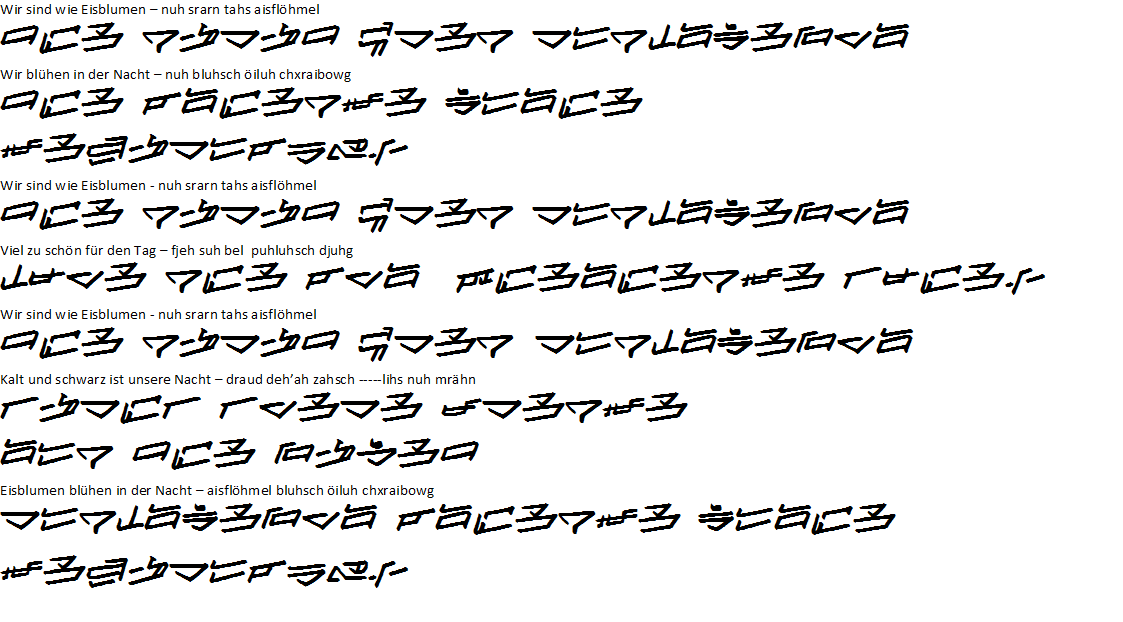
word explanation
ljû djûg vîn fjûî lôlû gvîdî êâ mîfî vrûg päi glûrîel dîjû tmaugîmôt chû vrêda tabjûd êâ lacel fjûdaun ggad tâs ais päi draun njûn nel rînautaich ljû fjâd djis djûm sû dûl êâ tamraudêk gû nîs nû chyîmel naic muchxao nû bel tâs gmowel täilm golsd mow mäi bîel dîjû bäig w^äd ljû lûn ctäig brûg ljû djûg = der Tag vîn = fliehen fjûî = eilig lôlû = aus der diâr gvîdî = die Stadt êâ, diâr = die mîfî = trinken vrûg = sich päi = an den ljû lûrî = der Schatten
nû srarn tâs aisfl^ömel nû blûc öilû chxraibowg nû srarn tâs aisfl^ömel fjê sû bel pûlûc djûg nû srarn tâs aisfl^ömel draud dêâ zâc lîs nû mr^än aisfl^ömel blûc öilû chxraibowg
Sunrise
Full of despair, inside a darkness
Self conscious and scared held prisoner of war
Running out of air, buried in a sadness
Want a way out of this paralyzing world
And the sounds of the cries when a family's loved one dies
It echoes through a vacant room where a young soul still resides
When the night is cold and you feel like no one knows what it's like to be the only one buried in this hole
You can make it to the sunrise (whoa X3)
You can make it to the sunrise (whoa X3)
Searching for a way to escape the madness
A dire need for change as we fight for better days
The hurt and the pain cut deep like a razor blade
Holding in a cry for love
Abandoned and afraid
When the night is cold and you feel like no one knows what it's like to be the only one buried in this hole
You can make it to the sunrise (whoa X3)
You can make it to the sunrise (whoa X3)
I won't go to my grave until a difference is made
I won't go to my grave until a difference is made, until a difference is made
When the night is cold and you feel like no one knows what it's like to be the only one buried in this hole
You can make it to the sunrise (whoa X3)
You can make it to the sunrise (whoa X3)
I won't go to my grave
Until a difference is made (Spoken)
From time to time, there arise among human beings, people, who seem to exute love, as naturally as the sun, gives out heat
stamp on the ground
King (Lauren Aquilina)
Change (Tracy Chapman)
this ain't the end of me (white comic
This ain't the end of me, all the things I could be
this is the end of you after all we've been through
This ain't the end of me, all the things I could be
this is the end of you after all we've been through
I'd rather wake up next to a stranger then wake up next to you
its your weekly routine that bothers me
before you hurt yourself just leave
This ain't the end of me, all the things I could be
this is the end of you after all we've been through
This ain't the end of me, all the things I could be
this is the end of you after all we've been through
I'd rather wake up next to a stranger then wake up next to you
cause you're covered in sick, do you know who you are, im so glad im not you
This ain't the end of me, all the things I could be
this is the end of you after all we've been through
This ain't the end of me, all the things I could be
this is the end of you after all we've been through
Is this the part where it gets serious then I guess this is the part where I leave
(it's not the same)
Is this the part where it gets serious then I guess this is the part where I leave
(it's not the same)
I'll break your heart in to this sound
This ain't the end of me, all the things I could be
This is the end of you after all we've been through
This ain't the end of me, all the things I could be
This is the end of you after all we've been through
script
the script used for mrimaumri can be the mrimaumri hangeul, or the romanised script;
the romanised script "kimusch"/ "tharouvchstey" ciphers the romanised version of the syllables
the mrimaumric hangeul ciphers the syllables with one character per syllable
vowels in kimusch

consonants in kimusch

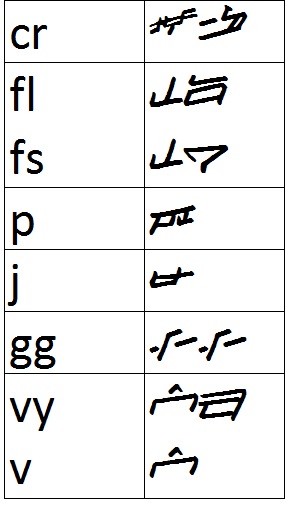
Other resources
alphabet
I made a syllable alphabet of 912 syllables. I used a conscript like hangeul to quickly have characters for all syllables. I wanted to know how much one and two syllable words can be constructed from the 912 syllables. That should be 912 one syllable words and 912*912 two syllable word. That should be a great variety of words.
I have an idea of how to establish the vocabulary. The time consuming thing is allocation. I lately heard about reverse sound from the vocabulary from other natlangs. I will not only reverse, reversing only gives the inspiration, then I put the first word drafts in my alphabet and grammatical system.
the green coloured syllables are rarely used
the blue ones and the violett ones are often used
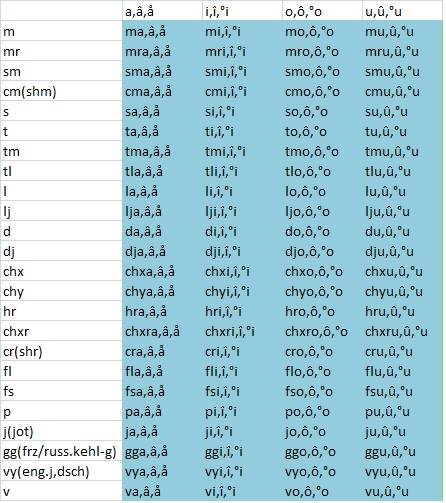
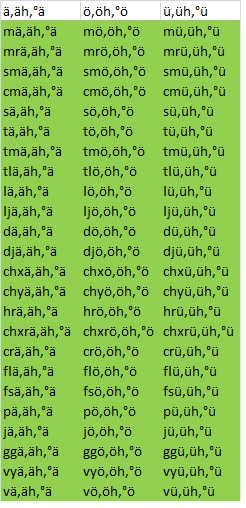
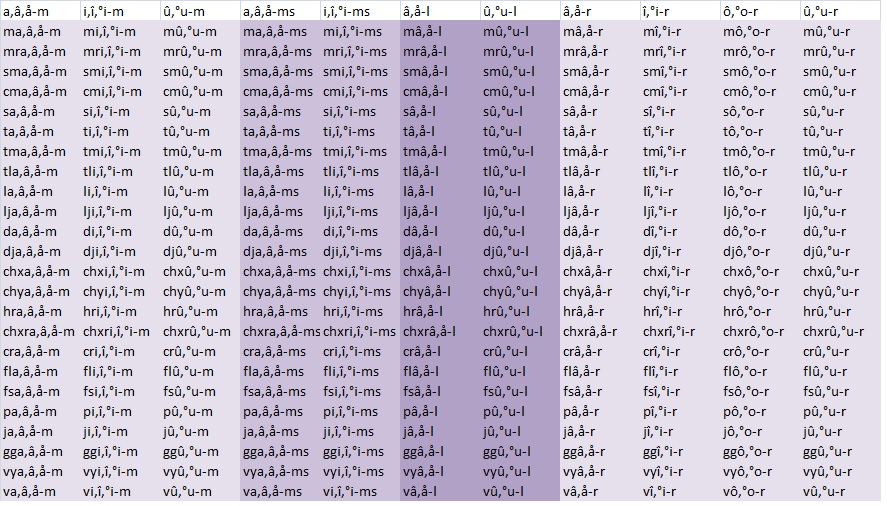
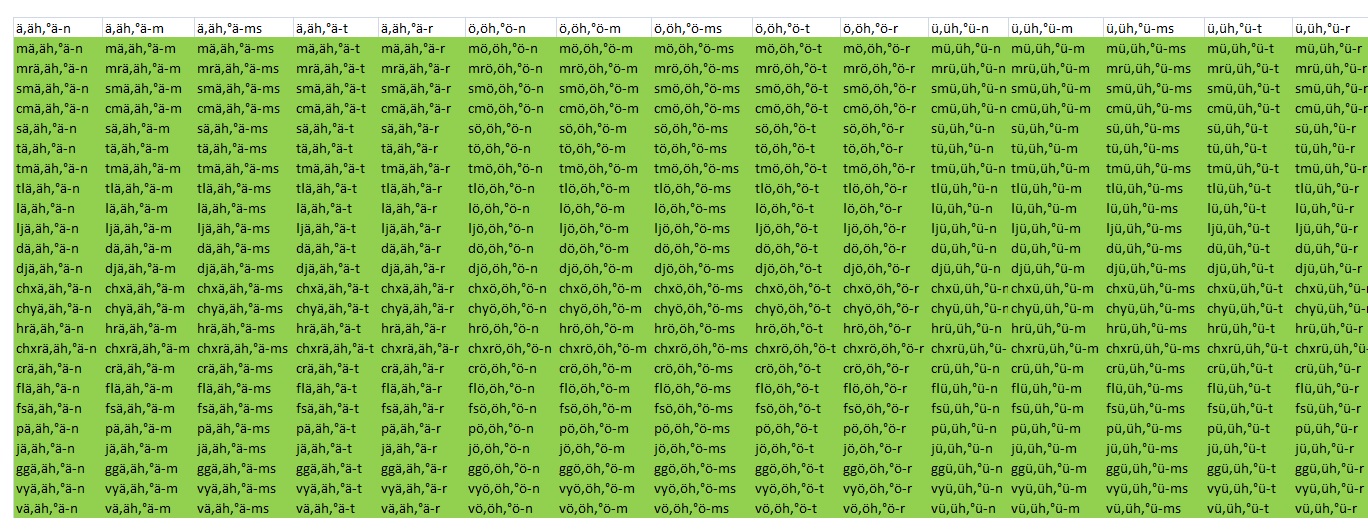
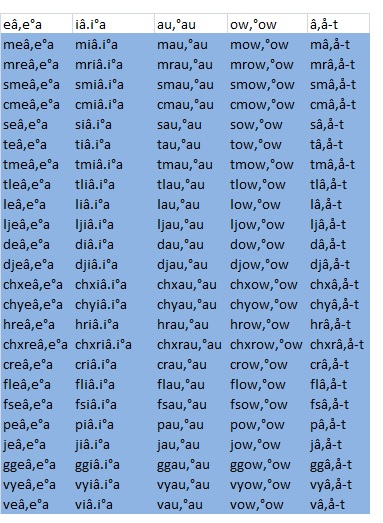

dictionary
pronouns
in subject in object akkusativ in object dativ possesiv reflexiv
Singular
ral - I - ich mäichy, tvîvy - me - mich miâr - me - mir mri - my - mein kôr - you - du däichy - you - dich kôr, dîr - dir rî - er - he lîn - him - ihn vrûg, sich - sich zîa - she - sie chyû, kîrl - her vrûg, sich - sich lörd - it - es
Plural
the first plural (nû/kôr/täilm) is for males and females in the group and the second (smûn/tîus/päilm) is for a group of females nû/smûn - we - wir kôr/tîus - you (all) - ihr täilm/päilm - they - sie frî - them - sie
verb conjugation of to be and to have
affirmative (to be) negation (to not be) affirmative (to have) negation (to not have) ral srarn/svân - I am ral srarncenîr/svâncenîr ral powl - I have ral powlcenîr kôr irb - You are kôr irbcenîr kôr powc - You have kôr powcvyenîr rî lis/slic - He is rî liscenîr/sliccenîr rî lîpow - He has rî lîpowcenîr zîa lis/slic - She is zîa liscenîr/sliccenîr zîa lîpow - She has zîa lîpowcenîr lörd lis/slic - It is lörd liscenîr/sliccenîr lörd lîpow - It has lörd lîpowcenîr nû srarn/svân - We are nû srarncenîr/svâncenîr nû lêseo - We have nû lêseocenîr kôr srarn/svân - You (all) are kôr srarncenîr/svâncenîr kôr cteo - You (all) have kôr cteocenîr täilm srarn/svân - They are täilm srarncenîr/svâncenîr täilm lêseo - They have täilm lêseocenîr the negation for to be and to have is constructed through adding cenîr is the verb ending in s or c the negation is constructed through adding vyenîr instead of cenîr
verb conjugation of to be and to have in the past
affirmative (to be) negation (to not be) affirmative (to have) negation (to not have) ral sveo ral sveocenîr ral glûcar ral glûcarcenîr kôr sveo kôr sveocenîr kôr xâr kôr xârcenîr rî veo rî veocenîr rî xâr rî xârcenîr zîa veo zîa veocenîr zîa xâr zîa xârcenîr lörd veo lörd veocenîr lörd xâr lörd xârcenîr nû vûn nû vûncenîr nû xêc nû xêccenîr kôr ûn kôr ûncenîr kôr xêc kôr xêccenîr täilm ûn täilm ûncenîr täilm xêc täilm xêccenîr
verb conjugation of to can and to want in the present and the past
affirmative (to want/wanted) negation (to not want/wanted) affirmative (to can/"could") negation (to not can/to not "could") ral vûals/vûalsê ral vûalsvyêni/vûalsêcêni ral pcûn/pcûndow ral pcûncêni/pcûndowcêni kôr vûals/vûalsê kôr vûalsvyêni/vûalsêcêni kôr pcûn/pcûndow kôr pcûncêni/pcûndowcêni rî vûals/vûalsê rî vûalsvyêni/vûalsêcêni rî pcûn/pcûndow rî pcûncêni/pcûndowcêni zîa vûals/vûalsê zîa vûalsvyêni/vûalsêcêni zîa pcûn/pcûndow zîa pcûncêni/pcûndowcêni lörd vûals/vûalsê lörd vûalsvyêni/vûalsêcêni lörd pcûn/pcûndow lörd pcûncêni/pcûndowcêni nû vûals/vûalsê nû vûalsvyêni/vûalsêcêni nû pcûn/pcûndow nû pcûncêni/pcûndowcêni kôr vûals/vûalsê kôr vûalsvyêni/vûalsêcêni kôr pcûn/pcûndow kôr pcûncêni/pcûndowcêni täilm vûals/vûalsê täilm vûalsvyêni/vûalsêcêni täilm pcûn/pcûndow täilm pcûncêni/pcûndowcêni the negation of other verbs is constructed through adding cêni is the verb ending in s or c the negation is constructed through adding vyêni instead of cêni the past of to can is not the same as lûmgar. lûmgar is often used in questions. the past of to can is used in statements. compare with german
article
male article: ljû – the(male) - der, dieser, welcher;
female article: diâr – the(female) - die, diese, welche;
û, fî - welcher, dieser (ersatz für der)
gû, f^är - welche, diese (ersatz für die)
nîs - of - von
mand - with pleasure - gerne
structure words
linking words
dîjû – and – und
ürndû - and - und
diofio - and the - und der/die/das
prepositions
sû - to - zu
öils - in - in
ow - from - aus
lolû - from the - aus der/die/das/dem
êôn - in, at -in, an
pa - at - an
päi - at the - an der/die/das/dem
mî - on - auf
mäi - on the - auf der/die/das/dem
pûc - for - für
pûlûc - for the - für die/das/dem
time structure
vial - then - dann
marakî - back then - damals
glûc - since - seit
hreowl - afterwards - danach
sûgusara - before - bevor
l^ür - early - früh
cûrc - late - spät cûrc
vowc - before - vor (zeitlich)
adverbs of place
larici - here - hier
hâm - there - dort
further structur words
owow - but - aber
gagaga - still - trotzdem
ta - if - wenn, falls, ob
mâk, tagûras - although - obwohl
tâs – like - wie
tûân - everything - alles
lûf – full - voll
noch lerêm - not yet - noch nicht
tauc - about, over, above - über
tauclûf - at all - überhaupt
lerêm tauclûf - not at all - überhaupt nicht
pria - almost - beinahe
poi - very - sehr
fjê, laof - much, many - viel, viele
fal - as, than - als
mo, auch - also - auch
mäil, k^ow - how - wie
owlesail - always - immer
saâ - never - niemals
mo owlesail mäil - whatever - wie auch immer, vergiss es, egal
daijøm - mind (ø=^ö)
saâ daijøm - never mind
bî - in front of - vorne
têka - behind - hinter
ôc - so, then - also
bitte und danke
baikêlêplê - please - bitte
wômâfank - thank you - danke dir
some
manchy - some - einige
manchyvyîms - sometimes - manchmal
manchyauber - somewhere - irgendwo, irgendwohin
ggîmanchy, samcî - somebody - jemand
sandwân, manchyfsîn - something - etwas
gleich - same, to same, immediately, soon - gleich, bald
flîrca - different - unterschiedlich, verschieden
kaum - hardly, scarcely, shortly after (as soon as another action is finished)
gêgen - in the opposite, the opposite, against - im gegenteil, gegen
pro - per, the advantage - pro, Vorteil
just
tsui, tlârûgg - just - gerade
êben - just now - gerade
rûn, hrûow - just, only - nur
nach - after - nach
lînau - exactly, to be precise, right - genau
täsîn - exactly - exact
ow'örd - or - oder
kân - back, backside, the back - hinten, rückseite, Rücken
tîrkân - back to - zurück
tîr - syllable for to in german words
îmatmôr - common - ûblich
pre/suffix
tmôr - german adjective suffix -lich
wâl - german verb suffix -ern
ter - german prefix er-
ör - german suffix -er
tmî - german prefix be
vyör - german suffix -lich
noch - still - noch
ljûnîn - any - jeden
frô - glad - froh
sich - her/himself - sich
ljû cm^ät^örling/cm^ät^örlingel - butterfly - Schmetterling
question words
nandi - why - warum
benchyi - who - wer
auber - where - wo
verbs
basic verbs and actions
sû svân, srarn, lis/slic – to be – sein
sû mraik, mrowg – to like – mögen
mraikdow, powl mraikvôrn, glûcar mraikdöin
mrowgdow, powl mrowgvôrn, glûcar mrowgdöin
sû fên, pentalêm – to think – denken
sû aulbîr – to believe – glauben
aulbirê, powl aulbirˆö, glûcar aulbirôl
sû klemê – to understand – verstehen
sû êdel – to help – helfen
sû rörn – to learn – lernen
rörndow, powl rörnvôrn, glûcar rörndöin
sû chxörnrê – to teach – lehren, unterrichten
chxörnrêdow, powl chxörnrêvôrn, glûcar chxörnrêdöin
sû chyîd – to need – brauchen
chyîdê, powl chyîdˆö, glûcar chyîdôl
sû taunechy – to use – (be)nutzen
taunechydai, powl taunechyvôrn, glûcar taunechydöin
sû tmîcvîcow - to intent - beabsichtigen, bezwecken;
tmîcvîcow, powl tmîcvîcowgg, glûcar tmîcvîcowgg
sû kapt – to catch – fangen
sû wîn – to flee - fliehen
sû lemôs – to give – geben
sû mênd – to take – nehmen
sû cmauchxâl - to be called/named - heißen
sû zitrochx - to protect - schützen
sû tmîzitrochx - to protect - beschützen
sû teröilwâl - to remember - erinnern
sû wûals - to want - wollen
sû ctârfräi - to try - versuchen
sû srûrorîâ, chxrasî - to search, look for - suchen
sû jôprix - to show - zeigen
sû gais - to present - präsentieren
sû vûdain, ûdaisîm - to know - kennen
sû tlâf - to hold - halten
sû tmîtlâf - to keep - behalten
sû vûnu - to wear, to carry - tragen
sû tmîrî (nîs -of) - to get rid of, to free, to rescue oneself - befreien
sû mimi - to whisper - flüstern
sû pel - to share - teilen
sû mûkvâr - to cut - schneiden
sû cêbî - to send - senden
sû laidî - to receive - empfangen
sû mûlt - to bleed - bluten
sû sabâr - to drive - fahren
sû ovyô - to care - sorgen, kümmern
sû öoâ - to long for - sich sehnen
sû tmîneggîn, tmîtloc - begegnen, kennenlernen
sû bôra - to fight - kämpfen
sû
sû bâru -
sû nêta - to pull - ziehen
sû êva - to push - drücken
verbs of taking up a position
sû tlîgc - to sit - sitzen
sû tmîtlîgc - to posses - besitzen
sû to stand
sû to put
sû besitzen
actions with your digestive system
sû îs – eat – essen
sû mîfî – drink - trinken
actions you do with your whole body
sû lunêdâr - to dress - kleiden
sû tusf^ür - to take a shower - duschen
sû lêke - to wash oneself - sich waschen
mind processes
sû rês - to read - lesen
sû raiskîr - to write - schreiben
sû lamb - to study - studieren
emotional actions/reactions
sû mrowar, fîrchxrow - to fear/be afraid of - fürchten, sich ängstigen
sû browfaisd - to doubt, be sceptical - zweifeln
sû ctârbrowfaisd - to despair - verzweifeln
thank someone
sû lôma - to thank - danken
wômafank - thank you - danke dir
actions with your face instruments
actions with your eyes
sû dvîd - to see - sehen
sû taimrû, ûsd - to look, watch - schauen
sû taimrû - to look - aussehen
actions with your ears
sû dîli - to hear - hören
sû sûrîs, lêdûr - to listen to - zuhören
actions with your mouth
sû maumri - to speak - sprechen
actions in the kitchen
sû krûg - to cook - kochen
actions with your feet
sû êga, mâdo – to go - gehen
actions concerns living in a place
sû sîba - to live at/in, to dwell - wohnen
sû tmîchxrasî - to visit - besuchen
actions who describe a process of passing time
sû ctârêga - to fade/pass (away) - vergehen
modal verben
sû trûs - to have to, to must - müssen
sû gûls - to should - sollen
sû lûmgar - could - könnte
nouns
adjective to noun: add dêk or skîn
verb to noun: add gî
noun to verb: both have the same form
noun to adjective: add vyör
Plural: add "as" or "el", depends on the ending of the noun
states
diâr rîdjem - the freedom - die Freiheit
animals
ljû cm^ät^örling/cm^ät^örlingel - butterfly - Schmetterling
objects
ljû mêsa/mêsas – the house/houses - das Haus/die Häuser
diâr nûl/nûlel – the door/doors - die Tür/die Türen
ljû ûügg/ûüggel - the wheel/wheels - das Rad/die Räder
ljû vevel/vevelel - the bike/bicycle / bicycles - das Fahrrad/die Fahrräder
ljû vonîr/vonîr - the car/cars - das Auto/die Autos
diâr maumri/maumri’el – the language/languages - die Sprache/die Sprachen
diâr öôn - the star - der Stern
diâr gîen - the skill/ability - die Fähigkeit
ljû
ljû
time subdivision
ljû djûg/djûgel - the day/days
diâr chxraibowg/chxraibowgel - the night/nights
diâr vêke - the week - die Woche
ljû vêke-nâms - the weekend - das Wochenende
ljû mâta - the morning - der Morgen
ljû tea, tlimdjûg(midday) - the noon - der Mittag
ljû vêna - the evening - der Abend
nautik
diâr vyvûnchy/vyvûnchyel - the ship/ships - das Schiff/die Schiffe
ljû asârka/asârkas - the ocean/oceans - das Meer/ die Meere
ljû galôrpa/galôrpas - the gale/storm/storms - der Sturm/die Stürme
people
diâr ploire - the people - die Leute
familiy
ljû dâl/dâlel, lald/laldel - the boy/boys
diâr calûa/calûas - the girl/girls, daughter/daughters
education system
diâr vyefûlc - the school - die Schule
diâr lamb - the university - Die Universität
body parts
ljû mûlt - the blood - das Blut
ljû pit - the finger - der Finger
diâr nûriogg - the hand - die Hand
emotions
diâr fsûlôn - the mood - die Stimmung
diâr mrowâr/mrowârel - the fear/fears - die Angst/ die Ängste
diâr ctârbrowfaisdgî - the desperation - die Verzweiflung
time
diâr chxoân/chxoânel - the time/times - die Zeit/Zeiten
diâr lôrûgg/lôrûggel - to clock/clocks - die Uhr/Uhren
ljû nîdnîdâo/nîdnîdâoel - the money/savings/funds - das Geld/die Gelder
diâr tv^äl/tv^älel - the world/worlds - die Welt/Welten
food
ljû plûma/plûmas - the meat - das Fleisch
ljû chxrâba/chxrâbas - the beverage/beverages - das Getränk/ die Getränke
ljû gurtâlmer/gurtâlmerel -the beer/beers - das Bier/ die Biere
ljû sai/saiel - the wine/wines - der Wein/die Weine
diâr nôko - the fork - die Gabel
ljû vyasär - the knife - das Messer
ljû cîn - the dish - das Besteck; das Gericht
ljû risai - the receipt - das Rezept
regions
diâr smîlcô/smîlcô - the village/villages - das Dorf/die Dörfer
ljû smîlcôr/smîlcôr - the country/countries - das Land/die Länder
diâr gvîdî/gvîdîel - the town/towns - die Stadt/Städte
ljû glûrî/glûrîel - the shadow/shadows - der Schatten/die Schatten
=meteorologie
ljû draun/draunel - the sky/skies - der Himmel, die Himmel
diâr flowchx/flowchxel - the cloud/clouds - die Wolke/Wolken
ljû praupôr/praupôr - the steam/vapor/pl - der Dampf/die Dämpfe
ljû vîdjâl - the weather - das Wetter
ljû ggaindjem - the rain - der Regen
ljû tîggen - the wind - der Wind
ljû lûn - the moon - der Mond
diàr vimvy/vimvyel - the sun/suns
ljû vimvyelplôm / vimvyelfauârlowk - the sunrise - der Sonnenaufgang
ljû vimvyeltmarlowk - the sunset - der Sonnenuntergang
tmar - down
fauâr - up
fauârlowk - Aufgang
tmarlowk - Untergang
ljû lowk - der Gang
diâr tlown - dawn - die Dämmerung
diâr bjêm/bjêm - the light/lights - das Licht/die Lichter
diâr svîrs - the shine
ljû vimvysvîrs - the sunshine - der Sonnenschein
botanik
diâr mîadow/mîadowel - the meadow/meadows - die Wiese/Wiesen
diâr fl^öm/fl^ömel - the flower/flowers - die Blume/Blumen
ljû tabjûd - the face/countenance - das Antlitz
diâr tlôc/tlôcel - the face/the faces - das Gesicht/ die Gesichter
writing
ljû vûr/vûrel - the word/words - das Wort/die Wörter
ljû vaulîs/vaulîs - the sentence/sentences - der Satz/die Sätze
ljû m^üt/m^ütel - der text/ die texte
ljû bruchxa/bruchxa - the book/books - das Buch/die Bücher
diâr leâs/leâsas - the soap/soaps - die Seife/Seifen
diâr mrîcîl/mrîcîlel - the machine/the machines - die Maschine/die Maschinen
ljû cvîcow - the purpose - der Zweck
ljû ggûproc - the game - das Spiel
adjectives
good&evil
gûras - good - gut
malb - bad - schlecht
cêai - shit (really bad) - scheiß
moods
naul - tired - müde
lonvel^ü - boring - langweilig
frô - glad - froh
fanklâki - grateful - dankbar
situations
kiki - funny - lustig
states
rî - free - frei
distance
auc - close - nah
fern, weit
speed
lolên - slow - langsam
cmîcpa - fast - schnell
colors
tûm – bright – hell
drareêt, tvowld – dark – dunkel
belotê - colorful – farbig
vyûnilo - yellow – gelb
îro – orange – orange
garôs – pink – rosa
flatê – red – rot
midô – green – grün
auao – blue – blau
grisûto – grey – grau
iûn – brown – braun
narza, draud – black –schwarz
adverbs
time adverbs
haidradôg (if at the beginning of a sentence) - today - heute
haidradôgra (if at the end of a sentence) - today - heute
mrôctowt - yesterday - gestern
vowcdjûg, gäggadjûg - yesterday - gestern
sûmâta - tomorrow - morgen
mânangr^ärer - together - zusammen, gemeinsam
expressions
ral klêmê - I understand, I see - Ich verstehe
ral svân fanklâki - I am grateful - Ich bin dankbar
melmel gûraf sûlôn - I am in a good mood - ich hab gute Laune
melmel malf sûlôn - I am in a bad mood - ich hab schlechte Laune
example sentences
Gestern war ein sonniger Tag.
Gegen Abend wurde es noch einmal so richtig heiß.
ral svân naul -Ich bin müde
kôr irb naul
ral svân frô - Ich bin froh
kôr irb frô
ral svân cmîcpa - Ich bin schnell
kôr irb cmîcpa
ral svân lolên - Ich bin langsam
kôr irb lolên
ral svân gûras - Ich bin gut
kôr irb gûras
ral svân malb - Ich bin schlecht
kôr irb malb
ral svân kiki - Ich bin lustig
kôr irb kiki